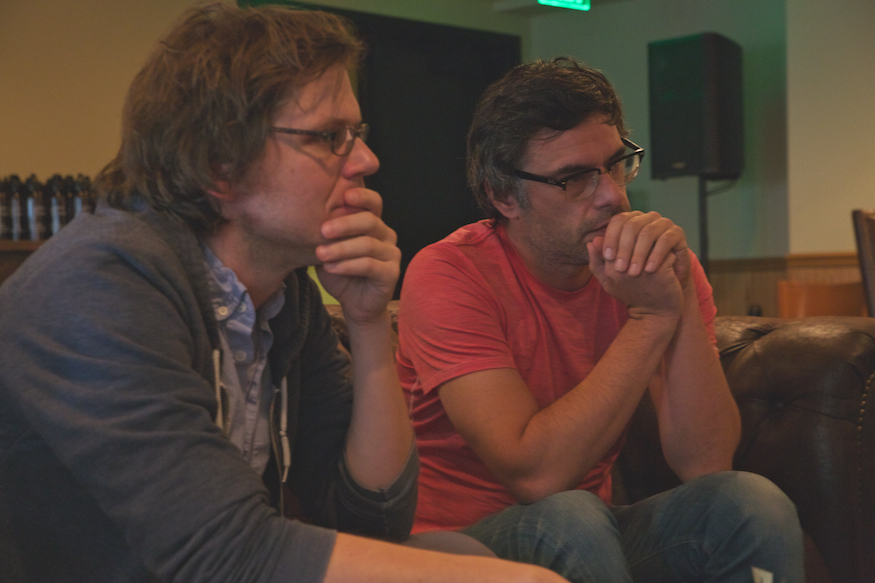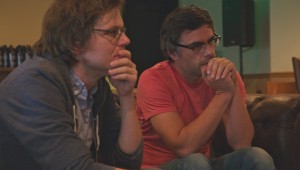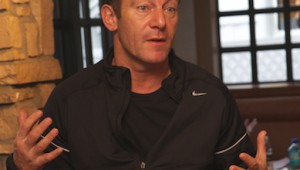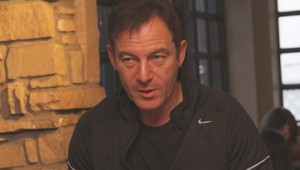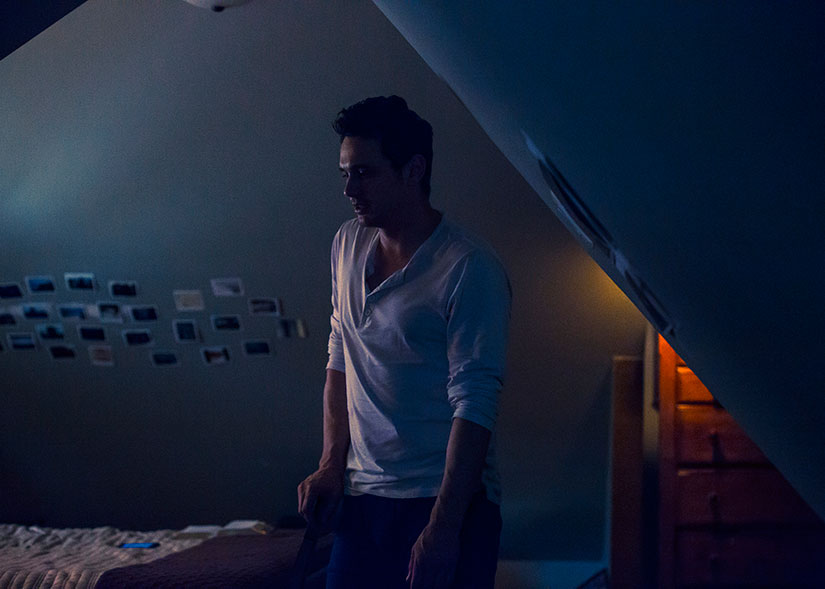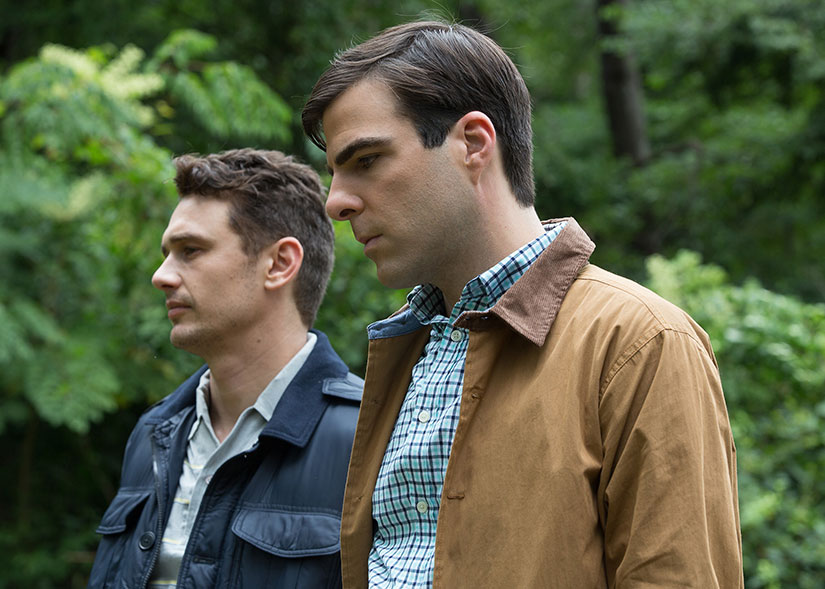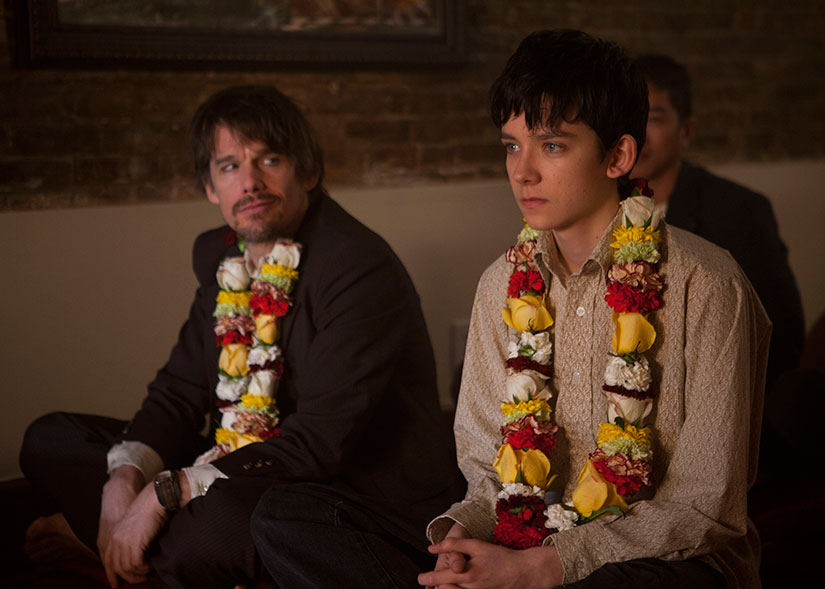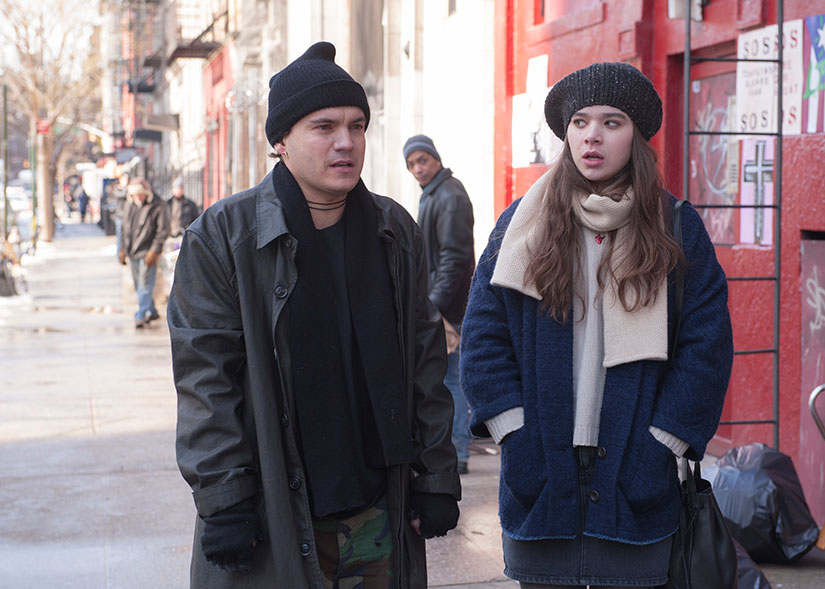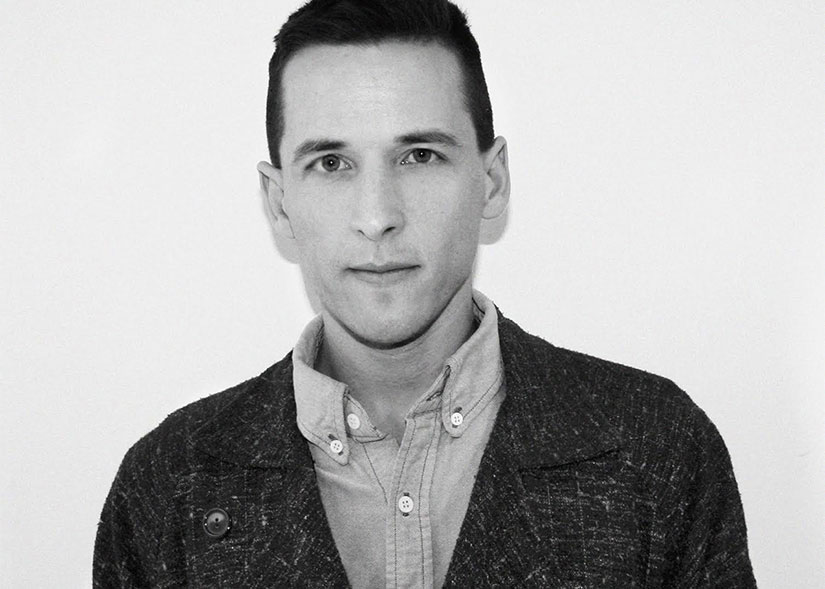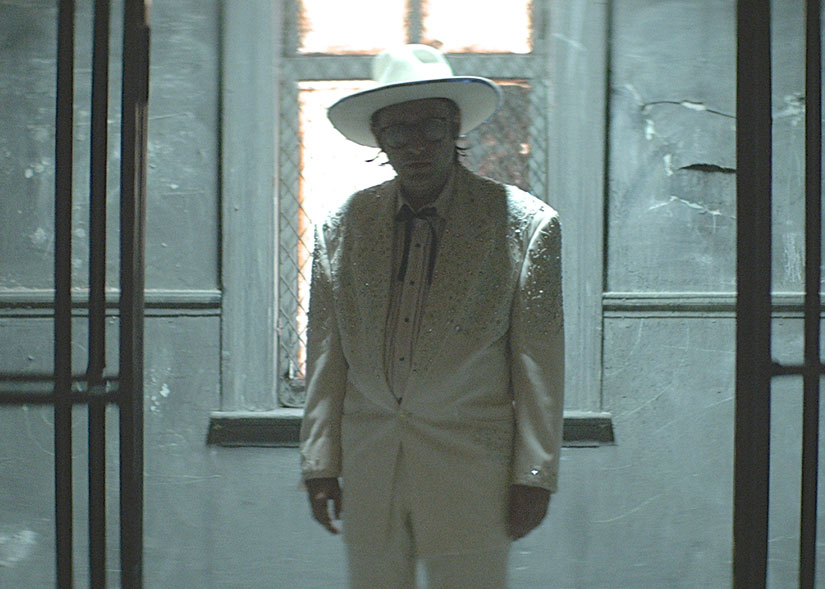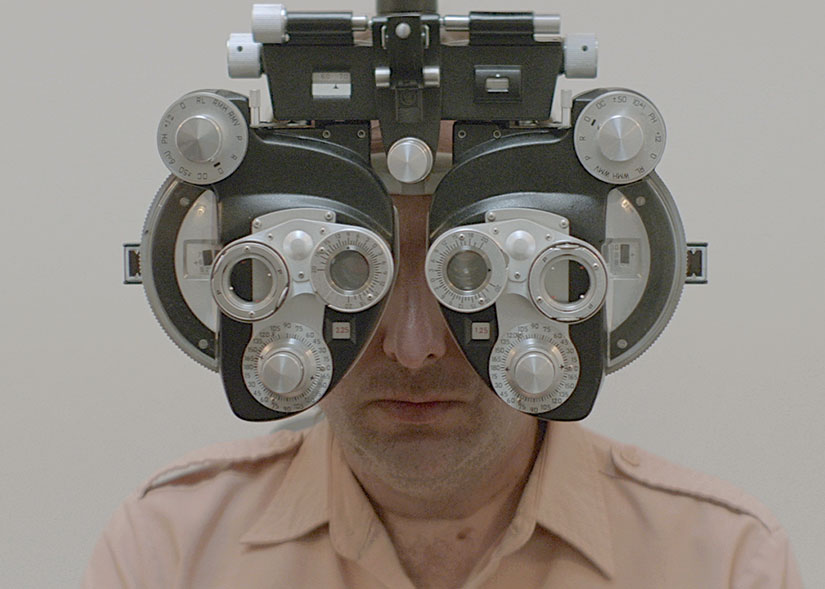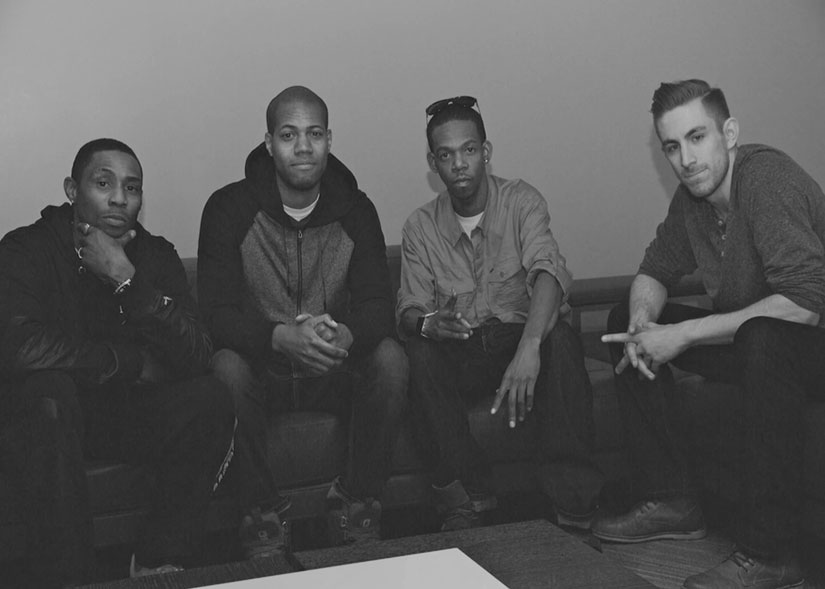[Sundance Roundtable Interview] Jim Strouse and Jemaine Clement (People, Places, Things)
Photos by J. Frank
During Sundance this year, we had the chance to sit down with Jim Strouse and Jemaine Clement, writer/director and star of People, Places, Things, respectively. Throughout our roundtable interview, the two shared their experiences working on the film, with Strouse sharing exactly how close the film was to him on a personal level, and how the film was able to succeed with Clement in place as the lead actor. We also decided to share the audio from the interview rather than transcribe it to see how it would be received. Hopefully, you'll be able to enjoy actually listening to the conversations we have behind-the-scenes rather than reading everything. Be sure to check out some of the photos J. Frank took of the interview below, as well!
[Sundance Roundtable Interview] Jason Isaacs and Saoirse Ronan (Stockholm, Pennsylvania)
Photos by J. Frank
During this year's Sundance Film Festival, I had the opportunity to talk to Jason Isaacs and Saoirse Ronan, two of the stars of the psychological indie drama, Stockholm, Pennsylvania. During our conversation, the two discussed their approaches to acting and how it differs from American actors, their on-set rapport with one another, and the drive behind their characters. We also decided to share the audio from the interview rather than transcribe it to see how it would be received. Hopefully, you'll be able to enjoy actually listening to the conversations we have behind-the-scenes rather than reading everything. Be sure to check out some of the photos J. Frank took of the interview below, as well!
[Sundance Review] I Am Michael
The story of Michael Glatze is a very intriguing one, so if you're unfamiliar with him or the New York Times article I Am Michael is based on ("My Ex-Gay Best Friend" written by Benoit Denizet-Lewis), I highly recommend reading it when you have time to spare. With that said, I Am Michael focuses on Glatze's journey from being one of the most visible, outspoken gay activists of the late '90s to becoming one of its most vocal dissenters as he renounced his homosexuality to become a Christian pastor later in life. As is the nature of biopics, a lot of details are glossed over for sake of pacing, time structure, etc., but overall, I Am Michael serves as a quick primer into the intriguing life of a once prominent "ex-gay."
I Am Michael
Director: Justin Kelly
Rating: N/A
Release Date: January 29, 2015 (Sundance)
Michael Glatze (James Franco) was a vital voice in the LGBT community, with his roles as a managing editor for XY Magazine and co-founder of Young Gay America magazine helping many other young gay youth find a strong voice to help with their own personal journeys. During this time, he was in a committed relationship with long-time boyfriend and former co-worker, Bennett (Zachary Quinto). Always intrigued with queer theory and identity, Glatze was always debating what exactly defined homosexuality outside of the base simplicity of same-sex attraction. However, following a health scare in which he was worried he inherited a terminal heart disease from his father, Glatze slowly found himself embracing the teachings of Christianity, culminating with his public renouncement of his homosexuality in 2007 to become a Christian pastor. He then began to write articles and public blogs denouncing homosexuality as vile and a sin. I Am Michael keys into pivotal moments of Glatze's transformation from the final days at XY through the launch of YGA to his meeting his future wife, Rebekah (Emma Roberts) at Bible school following his self-discovery.
It's easy to take sides with a film about such a divisive story such as Glatze's, but writer/director Justin Kelly was able to display the facts without an impartial bias or agenda. This wouldn't have been accomplished so successfully without a strong actor like Franco at the fray to handle the nuance of portraying a character that runs the entire spectrum of sexual identity while still keeping true to a base personality trait of helping others. Indeed, what's interesting about Glatze's story is that he's always been one to impart wisdom and guidance to people, whether as an activist or editor for prominent LGBT media or as an aspiring pastor. Franco's portrayal as a man haunted not so much by his sexual desires (although episodes of his struggle to come to terms with his heterosexuality do arise), but his spiritual desire to be reunited with his parents whom he lost at an early age becomes the primary conflict of the film rather than the surface level conflict of sexuality.
Unfortunately, as is often the case of biopics, the film's pacing feels off, especially when it begins to pick up momentum, just to lose flow due to a title card indicating a time jump between scenes. Furthermore, while the major moments in Glatze's life are carefully chosen, I Am Michael still felt like it ran too long with moments of disengagement taking places between the major moments of conflict. On a more positive note, the performances are handled deftly, with Franco delivering a great performance. Roberts, despite only appearing in the film's third act, also comes on screen with a breath of fresh air as the alluring, though naive (and ultimately accepting) Rebekah. Quinto, however, felt a bit underutilized in his role as Glatze's long-term/former boyfriend, despite sharing the bulk of the first two acts' screen time alongside Franco.
I Am Michael should be received well as it does the festival circuit and finds release in indie and arthouse theaters. Franco's portrayal as Glatze should also receive praise as it not only further expands upon Franco's range, but also shows his willingness to partake in passion projects alongside other major, big budget films. Those familiar with or intrigued by Glatze's story will also receive the film a lot better than those without any prior familiarity. However, everybody outside of these circles might find little to keep them interested in watching the film.
[Sundance Review] Mississippi Grind
Road films always follow the same formula: two or more characters of completely contrasting personalities are put together on some magical adventure or journey towards something that promises to change their lives, but it’s within that journey itself and not the destination where they find that same something. But what happens if one of the primary characters in the adventure is wholly unlikeable and never actually learns from their mistakes? What then?
Mississippi Grind
Directors: Anna Boden and Ryan Fleck
Rating: N/A
Release Date: January 24, 2015 (Sundance)
Gerry (Ben Mendelsohn) is a talented poker player, but like most gambling addicts, his habits have gotten the best of him. When the enigmatic Curtis (Reynolds) mysteriously shows up at a poker table Gerry's playing at, a rapport is somewhat struck between them. It's not until later that night at a local bar where Curtis and Gerry truly connect and spend the rest of the night galavanting across town wheeling and dealing, with Gerry realizing that Curtis is some type of good luck charm. Dangerously in debt to a mysterious woman, Gerry convinces Curtis to spot him some cash as they work various private poker tables, cruise ship games, and other various locales on their way to a supposed luxurious house game in New Orleans where the buy-in begins at $25,000. However, along the way, Gerry's true character and intentions are revealed, while Curtis discovers a side of himself through Gerry that makes him second guess the trip.
While Curtis is somewhat similar to the majority of Reynolds' past roles (charming, alluring, etc.), he obviously shines with these types of characters. There's also a bit of a magical element to Curtis that might be subtly alluded to, or could just be myself trying to inject an extra layer into a film that desperately needs more. Mendelsohn also portrays Gerry's greasy, untrustworthy character to a T. However, it's in the writing of his character and the overall narrative that irked me the most. To risk a potential spoiler, Gerry never learns anything by the end of the film. In a way, films that end with life lessons are predictable and ultimately don't serve a true purpose, while films like Mississippi Grind where characters don't have that moment of enlightenment are a lot more real and grounded. Yet, it doesn't work with this film, especially for one that pushes just how dangerous gambling addiction can be, especially for a character like Gerry who doesn't know when to quit. Curtis' character shows more growth and development, but it's a shame that his arc is relegated to a subplot to make room for Gerry's non-transformation.
Mississippi Grind will make some money at the box office thanks to Reynolds' involvement and A24 purchasing the distribution rights. However, it's a mediocre film that will garner some laughs, but will ultimately prove to be a gamble on opening weekend for most.
[Sundance Review] Ten Thousand Saints
I love period pieces that are a closer to contemporary time than those that are set centuries in the past, primarily because I find them easier to connect, the attitudes, culture, dress, etc. isn’t too different from modern times, and because they’re so close in time that fully imagining that world isn’t much of a stretch. The best element of period pieces, however, is the universal understanding that, no matter what decade the film takes place in, what world crises are taking place, we all share and face the same problems. Ten Thousand Saints is a succinct look at broken homes, the straight-edge movement, and how unexpected accidents could be the solutions to some of our problems.
Ten Thousand Saints
Directors: Shari Springer Berman and Robert Pulcini
Rating: N/A
Release Date: January 23, 2015 (Sundance)
The film opens in 1980 Vermont where a young Jude witnesses his mother Harriet (Julianne Nicholson) kick his father Les (Ethan Hawke) out for impregnating her best friend. Upon asking whether Les will come back, Jude is hit with the shocking revelation that he’s adopted. Fast forward to New Year’s Eve 1987, and Jude (Asa Butterfield) is an aspiring punk alongside his best friend, Teddy (Avan Jogia). Despite not visiting for years, Les sends his girlfriend’s daughter, Eliza (Hailee Steinfeld) out to Vermont to spend time with Jude as a means of connecting. Upon meeting, the three have an instant connection through their similar interests in music and drugs. During a chance encounter at a party that night, Eliza and Teddy have sex while Jude is beat up by some jocks. As Jude and Teddy part ways with Eliza, they take one final trip off of air conditioning unit fluid and pass out. The next morning, Teddy is found dead.
Reeling from the loss, Jude is reunited with Les, now a drug dealer, who offers him the chance to move to New York with him and experience real big city life. There, he reconnects with Eliza and Teddy’s older brother, Johnny, who is a singer for a rising straight-edge hardcore band (straight-edge referring to the culture of no drugs, alcohol, or promiscuous sex). It’s soon discovered that Eliza is impregnated with Teddy’s child, and rather than stir the hornet’s nest more, the three come to the conclusion to say it’s Johnny’s baby while keeping it a secret from Les and Eliza’s mother, Diana (Emily Mortimer). However, when the truth is revealed, the three of them run off to find whatever it takes to make their family dynamic work, even if one of them is harboring a secret that threatens to throw the entire group’s functionality off.
The major theme in Ten Thousand Saints is the dynamic between parent and child. Throughout the film, these bonds and connections are dysfunctional in many ways, as closely examined in the Jude and Les bond, but also seen between Eliza/Diana, Johnny and Teddy and their unseen mother, and even the crux of the film’s plot between Eliza and her unborn child. To frame these relationships amidst the rising hardcore/punk rock movement and the gentrification of Manhattan, specifically surrounding the 1988 riots in Tompkins Square Park, helps contextualize the never-ending cycle of change and growth in life with events that fall in line with the teenage memories of those who are middle-aged parents now, furthering the parental theme in the film.
Hawke shines in his supporting role as Les, channeling some similarities with his Boyhood character as a "part-time" parent who always shows up at the right moments to give wisdom or to help when absolutely needed. Both Butterfield and Steinfeld show growth in their performances, with Butterfield perhaps benefiting the most with a role that could help land him more mature roles in the future. Hirsch, not one to shy away from physically transforming himself for a role, appears a bit odd in the film, but certainly fits the mold of a straight-edge hardcore singer in late-'80s New York.
Ten Thousand Saints highlights small fragments of all of the different cultures it's full of (young parenthood, strained parent/child relationships, 1980s New York, straight-edge/hardcore, young love, coming-of-age, etc.), but does it in a way that it never feels too overwhelming. However, the film might not appeal to those that are uninterested in such things, especially the film's primary stage of New York.
[Sundance Interview] Justin Kelly (Director of I Am Michael)
Video shot and edited by J. Frank.
I Am Michael, the upcoming film featuring James Franco as Michael Glatze, a former gay rights and LGBT icon who famously renounced his homosexuality to become a Christian pastor, is set to for its worldwide premiere tonight during this year's Sundance Film Festival. The film, which is based on the New York Times article "My Ex-Gay Best Friend" written by Glatze's former best friend, Benoit Denizet-Lewis in 2011, explores Glatze's relationship with his long-time ex-boyfriend, Bennet (Zachary Quinto), and his religious awakening.
We had the chance to interview the film's director Justin Kelly about the film, working alongside Franco and Quinto, whether Glatze and Denizet-Lewis had any involvement with the film, and more. Be sure to come back later this weekend for our full review of I Am Michael.
[Sundance Review] Entertainment
Three years ago, Rick Alverson’s previous film, The Comedy, premiered at Sundance. The reception was wholly divisive, with many either loving or hating it. In the same vein as The Comedy, Alverson’s follow-up film, Entertainment, intends to poke and prod at audiences with the same subversive fervor.
Entertainment
Director: Rick Alverson
Rating: N/A
Release Date: January 24, 2015 (Sundance)
The unnamed protagonist of Entertainment (referred to as The Comedian, portrayed by Gregg Turkington) is a middle-aged comedian touring the Californian desert while playing at less-than-stellar venues to even lesser-than-stellar audiences. By day, he’s a schmuck wandering around unpronounced areas, but by night, he slightly comes alive once he hits the stage. However, his jokes are alienating, jarring, and unforgivable, and when audiences heckle him, he heckles back twice as hard, creating awkward and uncomfortable situations. Throughout his journey, he leaves nightly voicemails to an estranged daughter who doesn’t seem too interested in seeing or hearing from him. The film comes to a head when The Comedian attempts to perform at a glitzy children’s birthday party in Hollywood, only to have a mental breakdown.
Fans of Turkington will instantly recognize The Comedian’s similarities to Turkington’s most famous character, Neil Hamburger. The jokes in the film resemble some Hamburger’s style of comedy that is intended to ruffle feathers and create unease within the audience. Indeed, it’s this uneasiness that’s carried over through the entire film. The Comedian is washed-up hasbeen (if he ever had been in the first place), and his desperation to justify his performances is truly uncomfortable to witness. Off-stage, his jarring discomfort is seen, such as an encounter with another man (Michael Cera) asking for help inside a rest stop bathroom.
The title Entertainment is used ironically, since the film doesn’t necessarily entertain audiences. Rather, the film challenges its viewers to truly examine what entertainment is and how much so-called entertainers have to go through to deliver their brand of “entertainment.” Juxtaposed with The Comedian’s self-deprecating performance is his tour buddy, Eddie the Opener (Tye Sheridan), who applies clown makeup and partakes in scat humor for laughs. Which of these approaches can be defined as “entertainment?”
From a film standpoint, Entertainment is admittedly boring and uninteresting where crowds will be split between those that “got” it and those that didn’t. However, from a deeper level of examining and critiquing art, Entertainment is the type of film that will have audiences picking it apart to find its true meaning. In saying that, it’ll fit well with fans of alternative/anti-comedy and art school crowds, but general audiences will avoid it.
[Sundance Interview] Cast and Director of Cronies
Video shot and edited by J. Frank.
When I said really enjoyed Cronies in my review, I meant it. The film embodies the complexities of camaraderie, friendships, and city life in a simple, digestible way that anybody can relate to it. During this year's Sundance Film Festival, J. Frank and I had the wonderful opportunity to talk with Zurich Buckner, George Sample III, Brian Kowalski, and Michael J. Larnell about the film. Cronies is bound to find distribution soon enough, so keep it on your radar over the year and make sure you catch it the first moment you get a chance.

